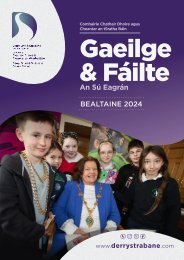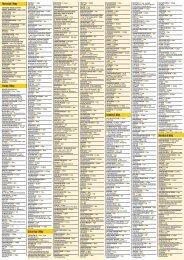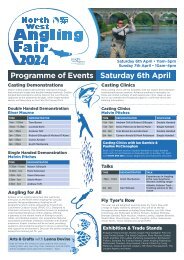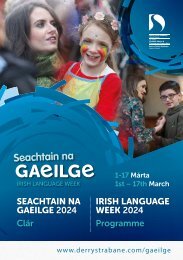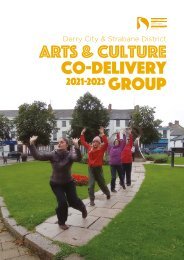CLIMATE- Adapting to Change Newsletter 2018
A snapshot of work going on to create a CLIMATE Adaptation Plan for Derry & Strabane over the last few months
A snapshot of work going on to create a CLIMATE Adaptation Plan for Derry & Strabane over the last few months
Create successful ePaper yourself
Turn your PDF publications into a flip-book with our unique Google optimized e-Paper software.
NEWSLETTER ISSUE 2 Issue 2<br />
<strong>Newsletter</strong><br />
Issue 2<br />
28/09/18<br />
COLLABORATIVE LEARNING INITIATIVE MANAGING AND ADAPTING TO THE ENVIRONMENT<br />
Steering Group Meeting<br />
Faroe Islands<br />
The Faroe Islands hosted the <strong>CLIMATE</strong> project’s third steeringgroup<br />
meeting, which was held on 4-7 June <strong>2018</strong>. The meeting<br />
was a great success both with respect <strong>to</strong> the technical side of<br />
project research and development and also the trips, excursions<br />
and social events planned by our Faroese partners.<br />
The meetings also enabled discussions and exploration of how<br />
<strong>to</strong> develop the best practice adaptation model and support <strong>to</strong>ols<br />
<strong>to</strong> be used by Derry City & Strabane District Council, Sundsvall<br />
Municipality and Harnosand Municipality in the development of<br />
their adaptation plans. The meetings were well attended with<br />
representation from all full partner organisations.<br />
In addition, a further workshop was held with representatives<br />
from across the Faroe Islands in order <strong>to</strong> share research and<br />
knowledge from the project. This served <strong>to</strong> increase awareness<br />
of the issue of climate change on the islands and suggested<br />
approaches from across the partner organisations.<br />
Project Partners at Sornfelli Metrological Station in the Faroe Islands<br />
The meetings and accompanying workshops and excursions<br />
provided an opportunity for partners <strong>to</strong> work <strong>to</strong>gether on a<br />
number of project outputs including research, stakeholder<br />
engagement, and communications.<br />
Project Partners working <strong>to</strong> progress the development of Adaptation Plans.
NEWSLETTER ISSUE 2 | Issue 2<br />
Cloudburst Strategy & Heatwave Guidelines – Sundsvall<br />
Partners from Sundsvall presented their work surrounding<br />
cloudbursts and heatwaves. The cloudburst model and strategy<br />
will be used <strong>to</strong> inform flood risk assessment, development<br />
planning, water management, and adaptation planning. The<br />
strategy is currently undergoing consultations before final<br />
approval by the municipality.<br />
Sundsvall Municipality have also completed guidelines for<br />
periods of heatwaves. These guidelines will be used for social /<br />
group housing in the city of Sundsvall with 40 properties<br />
selected for trial. The steering group involved in the<br />
development of this are <strong>to</strong> meet soon <strong>to</strong> start the consultation<br />
process with the guidelines due for ratification early 2019.<br />
Faroe Islands Climate<br />
An extract of modelled wind data in the Faroe Islands made the<br />
basis of a presentation held by the Faroese team. The main<br />
conclusion of this presentation is that while mean annual wind<br />
speeds have increased very little – almost nothing – during the<br />
last 60 years, the severity and frequency of extreme wind-speed<br />
events (using ≥ 25 m/s as a criterion) have soared particularly<br />
from the late 1980s and onwards.<br />
A further workshop was held for relevant public agencies and<br />
institutions from the Faroe Islands. Participants were given an<br />
overview of the <strong>CLIMATE</strong> project, its aims and objectives and<br />
also gained an insight in<strong>to</strong> adaptation planning in other regions<br />
as well as increased risks and threats within the Faroe Islands<br />
Stakeholder Engagement and Communication<br />
Workshops were held <strong>to</strong> explore and share experiences of<br />
different approaches <strong>to</strong> stakeholder engagement including how<br />
<strong>to</strong> effectively map relevant stakeholders, the importance of<br />
understanding stakeholder motivations and how <strong>to</strong> effectively<br />
engage them.<br />
<strong>CLIMATE</strong> Partners also had the opportunity <strong>to</strong> explore the<br />
Islands, learning about extreme weather which the Islands are<br />
facing and the impacts on their homes, lives<strong>to</strong>ck and transport.<br />
Above image of Partners at Sornfelli Metrological Station in the Faroe Islands.<br />
Adaptation Planning<br />
Research partners presented updates on the development of<br />
the adaptation planning model. A workshop provided<br />
opportunity <strong>to</strong> provide input for future development of the<br />
model. Partners broke in<strong>to</strong> small groups <strong>to</strong> analyse other<br />
adaptation <strong>to</strong>ols including Swedish Meteorological and<br />
Hydrological Institute, Climate Ireland and SECAP.<br />
Project Partners RAPID delivering a presentation on Stakeholder Engagement
NEWSLETTER ISSUE 2 | Issue 3<br />
Workshop held in Sweden<br />
April <strong>2018</strong><br />
On 20th April, a workshop was held in Sundsvall, Sweden and was<br />
attended by 32 participants across seven municipalities, the<br />
County of Västernorrland, Swedish Meteorological and<br />
Hydrological Institute and other service providers.<br />
Details of the <strong>CLIMATE</strong> Project, its aim and objectives were<br />
presented <strong>to</strong> the attendees by Jennie Sandstrom of Mid Sweden<br />
University. Joakim Bergsten from Sundsvall´s Municipality<br />
presented their work with cloudbursts and heatwaves <strong>to</strong> give<br />
examples on climate adaptation planning <strong>to</strong> inspire other<br />
communes.<br />
This was followed by a presentation from Anna Jonsson, National<br />
climate adaptation expert, who presented the new guide/<strong>to</strong>ol<br />
that aims at facilitating the climate adaptation work in<br />
small/medium-sized communes.<br />
During the workshop, participants broke in<strong>to</strong> smaller groups and<br />
focused on discussing obstacles/difficulties when working with<br />
climate adaptation plans. The main outcome from this was that<br />
most of the organizations are already working with climate<br />
adaptation somehow but they need more knowledge and<br />
resources <strong>to</strong> improve the planning. Obstacles identified included<br />
difficulty knowing how <strong>to</strong> prioritize, lack of coordination and lack<br />
of knowledge about specific impacts from future climate change.<br />
This was really useful in helping <strong>to</strong> understand the needs of<br />
decision makers when incorporating climate adaptation<br />
measures in<strong>to</strong> their work.<br />
Participants learnt how the guide was developed: in <strong>to</strong>tal 15<br />
“test-communes” throughout Sweden were involved and they<br />
had several opportunities <strong>to</strong> give input during the process. Viveka<br />
Sjödin from the County Administration gave a presentation<br />
about their new, revised climate adaptation plan (regional).<br />
Jennie Sandstrom, Mid Sweden University, presenting at the workshop.<br />
FUTURE WORKSHOPS<br />
Participants at the workshop sharing ideas on the obstacles faced when<br />
working with Adaptation Plans.<br />
<strong>CLIMATE</strong> Project partners will continue <strong>to</strong> host a number of<br />
workshops with their municipalities/local authorities. These<br />
workshops will be dedicated <strong>to</strong> increasing awareness of the<br />
impacts of climate change, informing participants on<br />
adaptation methods and promoting the incorporation of<br />
climate issues in<strong>to</strong> policy.<br />
It is the aim of the <strong>CLIMATE</strong> project <strong>to</strong> mainstream climate<br />
adaptation and have it embedded in the minds of future<br />
decision makers.
NEWSLETTER ISSUE 2 | Issue 4<br />
Republic of Ireland News<br />
University College Cork recently presented the <strong>CLIMATE</strong> project<br />
at the UCC Climate Lab Open Day in Cork. The event involved<br />
researchers from across the University involved in Climate<br />
Research, allowing each <strong>to</strong> do a flash presentation of their work.<br />
This helped <strong>to</strong> raise awareness of the <strong>CLIMATE</strong> project and<br />
engaged with other members of staff who may be working on<br />
research which could be useful <strong>to</strong> this project.<br />
Sophie Power, UCC, presenting at the UCC Climate Lab Open day in Cork.<br />
IN OTHER NEWS<br />
• Staff in Sundsvall, Sweden are also working on other climate adaptation measures including the management of s<strong>to</strong>rm<br />
water.<br />
Currently they are developing a process map showing where the decisions for measures handling s<strong>to</strong>rm water are being<br />
taken within the municipality. The results of this will be used <strong>to</strong> improve the management of s<strong>to</strong>rm water in the future.<br />
• <strong>CLIMATE</strong> project partners are currently preparing for the next steering group meeting which will take place in Rovaniemi,<br />
Lapland in November. This will be a great opportunity for partners <strong>to</strong> meet face <strong>to</strong> face and discuss the ongoing work of<br />
the project. A series of workshops for partners and external stakeholders will be held <strong>to</strong> promote the project and<br />
encourage future collaborations.
NEWSLETTER ISSUE 2 | Issue 5<br />
Adaptation Workshop, Derry<br />
Irish and Northern Irish Heatwaves<br />
July <strong>2018</strong> saw Northern Ireland and the Republic of Ireland<br />
experience a heatwave which resulted in Ireland being declared<br />
as in ‘a state of absolute drought’.<br />
An absolute drought is defined as 15 or more consecutive days<br />
of less than 0.2mm of rainfall. With temperatures soaring in<strong>to</strong><br />
the 30s, demand for water increased by 30% and resulted in a<br />
hosepipe ban being implemented for almost three weeks across<br />
Northern Ireland. High demand combined with high levels of<br />
evaporation caused by the uninterrupted sunlight has caused<br />
significant depletion of rivers, lakes and reservoirs, some of<br />
which may take months <strong>to</strong> recover.<br />
Jane McCullough, Climate NI, presenting <strong>to</strong> Derry City and Strabane<br />
District Council Staff<br />
On 17 th April, a workshop was held with staff from Derry City<br />
and Strabane District Council. This was facilitated by <strong>CLIMATE</strong><br />
project manager, Climate NI and Climate Ireland. This workshop<br />
introduced the aims and objectives of the <strong>CLIMATE</strong> project <strong>to</strong><br />
Derry City and Strabane District Council (DCSDC) departments.<br />
It specifically aimed <strong>to</strong>:<br />
• Identify and engage key council staff in the<br />
<strong>CLIMATE</strong> project, including development of an<br />
adaptation plan for the council area,<br />
• Increase awareness and understanding of the<br />
expected impacts of climate change across<br />
Northern Ireland<br />
• Facilitate council staff <strong>to</strong> consider the<br />
vulnerability of their region <strong>to</strong> current and<br />
projected climate change, and<br />
• Identify relevant existing council plans and<br />
policies.<br />
A <strong>to</strong>tal of 22 participants provided representation across most<br />
service areas. The approach taken by the workshop organisers<br />
was <strong>to</strong> use previous events as a <strong>to</strong>ol <strong>to</strong> encourage discussion and<br />
evidence gathering about impacts experienced, evidence<br />
recorded. The next stage will move thinking from being linked<br />
<strong>to</strong> his<strong>to</strong>ric events <strong>to</strong> strategically planning for the future based on<br />
scientific evidence.<br />
Gorse fires were also reported in a number of areas with<br />
emergency services struggling <strong>to</strong> contain the blazes due the<br />
relentless high temperatures and the arid nature of the<br />
landscape.<br />
Forest Fires, Sweden<br />
Pho<strong>to</strong> Credit: Fredrik Edlund - Emergency Services, Medelpad.<br />
In July <strong>2018</strong>, Sweden had <strong>to</strong> call for emergency assistance from<br />
its partners in the European Union <strong>to</strong> help fight a large number<br />
of wildfires which had broken out across a wide range of its<br />
terri<strong>to</strong>ry and prompted the evacuation of four communities.<br />
Tens of thousands of people had <strong>to</strong> remain inside and close<br />
windows and vents <strong>to</strong> avoid smoke inhalation with hundreds also<br />
being evacuated from their homes. Rail services were also widely<br />
disrupted. There have been huge fires in the past in Sweden, but<br />
not over such a wide area. The major fires covered around 19,000<br />
hectares in <strong>to</strong>tal, across the municipalities of Gävleborg, Dalarna,<br />
and Jämtland. The sparks come from a variety of sources: BBQs,<br />
cigarettes and increasingly lightning, which is becoming<br />
more frequent as the planet warms. Bans on starting fires had <strong>to</strong>
NEWSLETTER ISSUE 2 | Issue 6<br />
be introduced -- including bonfires and barbecues, in some areas<br />
even in private gardens.<br />
FOR MORE INFORMATION<br />
To keep up <strong>to</strong> date with the progress of the <strong>CLIMATE</strong> project, you can follow us on our various Social Media Platforms;<br />
Facebook: https://www.facebook.com/ClimateNPA/<br />
Twitter: https://twitter.com/ClimateNPA<br />
Instagram: https://www.instagram.com/climate.npa/<br />
Website: http://climate.interreg-npa.eu/








